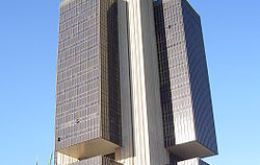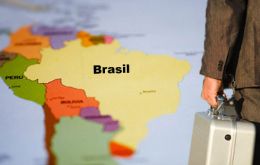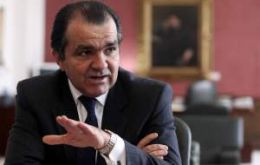MercoPress. South Atlantic News Agency
Economy
-
Friday, March 26th 2010 - 21:34 UTC
Quake destroyed ports limit Chilean grape industry exports

Chile’s fresh fruit business has been whip-lashed the past weeks by the 8.8 earthquake which struck February 27, at the height of the fresh fruit export season. Large shipments of table grapes - roughly four million cases - and other fruit had to be stored while authorities worked over time to get port facilities operating again.
-
Friday, March 26th 2010 - 04:27 UTC
Brazil ready to raise rates next April following strong rebound

Brazil's central bank policy-makers said on Thursday they are ready to raise rates next month to curb inflation pressure as jobs data highlighted the strength of the country's economic rebound.
-
Friday, March 26th 2010 - 04:23 UTC
Kirchner key ally says that inflation in Argentina can’t be denied, “it’s reality”

Argentina’s main union leader and a close political ally of President Cristina Kirchner, Hugo Moyano said that “inflation in Argentina is a fact, and nobody can deny it’s a reality”. His words follow previous statement from Economy minister Amado Boudou who admitted “prices’ tension but “not necessarily inflation”
-
Friday, March 26th 2010 - 04:18 UTC
Brazil/Argentina hold new round of talks to facilitate bilateral trade

Mercosur main country members, Argentina and Brazil begun on Thursday a two-day round of bilateral trade talks in Brazil to discuss basically whether to continue or not with the non-automatic licenses both countries hold.
-
Friday, March 26th 2010 - 01:53 UTC
Euro zone agrees € 22 billion ‘safety net’ for Greece including the IMF

Sixteen Euro zone countries have backed a financing plan to help debt-laden Greece, which will include IMF money. The safety net would total up to 22 billion Euros and would apply only if market lending to Greece dried up.
-
Friday, March 26th 2010 - 00:59 UTC
Chilean government announces biggest fuel price hike in months

Chile’s government has decided to “un-freeze” the increase of the gasoline prices considering that the value of both oil and the US dollar is growing all around the world.
By law, on March 25 the transitory price reduction to the specific oil tax must come to an end. The decree was passed last year to help the local economy given the financial crisis that affected many countries. -
Friday, March 26th 2010 - 00:53 UTC
Dubai World promises investors will get their money back (in eight years)

Investors in Dubai World have been told they will get their money back - but may have to wait up to eight years. The Dubai government has pledged more than £6bn of new funding for the restructuring plans of its flagship investment vehicle, whose assets include the QE2 and Turnberry golf course.
-
Friday, March 26th 2010 - 00:43 UTC
Former KGB agent buys The Independent and Independent on Sunday for £ 1

Former KGB agent and London’s Evening Standard owner Alexander Lebedev is buying The Independent and Independent on Sunday for £1, it has been confirmed. The Russian oligarch has snapped up the titles for the same price as a single copy of The Independent.
-
Friday, March 26th 2010 - 00:37 UTC
Uruguay outperformed other regional economies, expanding 2.9% in 2009

Uruguay outperformed all other Latinamerican countries last year, according to the latest available data on 2009 economic growth. The data shows the Uruguayan economy expanded 2.9% in 2009, compared to 1.2% for Peru and 0.9% in Argentina.
-
Thursday, March 25th 2010 - 03:20 UTC
Latinamerica, “winning region of the financial crisis”, says optimistic IDB

Latin American countries' banking and financial officials were optimistic Tuesday about their future development, saying most economies in the region were strengthened after the global financial crisis.
